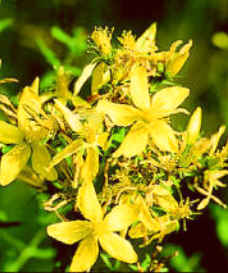
Plant Description
Caution & Interaction

Latin (botanical) name:
Hypericum perforatum
Common names: St. John's Wort
Plant Description: St. John's Wort is a bushy perennial plant, native to many parts of the world including California, Oregon, and Colorado in the United States, and in Europe. It grows wild to approximately 1-3 feet in forests, thick woods, hedges, and meadows. It has short barren shoots and erect stems that branch out in the upper part. It's leaves are opposite, sessile, entire, elliptic to oblong, not over 1 inch long, and covered with transparent dots. St. John's Wort blooms from June to August with numerous bright yellow flowers. The calyx and corolla are marked with black dots and lines. The flowers have five petals and three bundles of stamens joined by their bases. It's fruit is a 3-celled capsule containing small round black seeds which smell somewhat like resin.
Medicinal Properties &Uses: St. John's Wort has been used for centuries in the treatment of mental disorders and nerve pain. It is aromatic, astringent, expectorant, and nervine. An infusion of St. John's Wort tea before bedtime has proven to be effective against incontinence and urgency of urination. It has been used in all pulmonary complaints, hysteria and nervous depression, as well as in the treatment for diarrhea, worms, dystentery, and jaundice. As a sedative, St. John's Wort is useful in treating sleep disorders and mild to moderate depression. Additionally, this herb has proven useful in chronic catarrh of the lungs, bowels, and urinary passages. It can be used externally as a balm for wounds, burns, and insect bites.
Dosage: 20-60 drops in water or juice, 2-3 times daily or as needed.
Cautions & Interactions: Keep out of reach of children.
Efficacy Studies & Other Clinical Data:
Disclaimer (U.S. Only): These statements have not been evaluated by the FDA. These products are not intended to diagnose, cure, treat, or prevent any disease.
Common names: St. John's Wort
Plant Description: St. John's Wort is a bushy perennial plant, native to many parts of the world including California, Oregon, and Colorado in the United States, and in Europe. It grows wild to approximately 1-3 feet in forests, thick woods, hedges, and meadows. It has short barren shoots and erect stems that branch out in the upper part. It's leaves are opposite, sessile, entire, elliptic to oblong, not over 1 inch long, and covered with transparent dots. St. John's Wort blooms from June to August with numerous bright yellow flowers. The calyx and corolla are marked with black dots and lines. The flowers have five petals and three bundles of stamens joined by their bases. It's fruit is a 3-celled capsule containing small round black seeds which smell somewhat like resin.
Medicinal Properties &Uses: St. John's Wort has been used for centuries in the treatment of mental disorders and nerve pain. It is aromatic, astringent, expectorant, and nervine. An infusion of St. John's Wort tea before bedtime has proven to be effective against incontinence and urgency of urination. It has been used in all pulmonary complaints, hysteria and nervous depression, as well as in the treatment for diarrhea, worms, dystentery, and jaundice. As a sedative, St. John's Wort is useful in treating sleep disorders and mild to moderate depression. Additionally, this herb has proven useful in chronic catarrh of the lungs, bowels, and urinary passages. It can be used externally as a balm for wounds, burns, and insect bites.
Dosage: 20-60 drops in water or juice, 2-3 times daily or as needed.
Cautions & Interactions: Keep out of reach of children.
Efficacy Studies & Other Clinical Data:
-
Quackwatch - St. John's Wort Clinical Trialsm
-
The Health Gazette, Karl Hempel, M.D. - St. John's Wort
Disclaimer (U.S. Only): These statements have not been evaluated by the FDA. These products are not intended to diagnose, cure, treat, or prevent any disease.